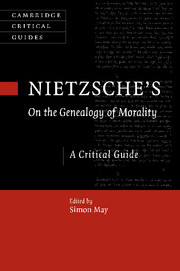Book contents
- Frontmatter
- Contents
- Contributors
- Acknowledgements
- Note on texts, translations, and references
- Introduction
- Chapter 1 The future of evil
- Chapter 2 On the nobility of Nietzsche’s priests
- Chapter 3 The genealogy of guilt
- Chapter 4 Why Nietzsche is still in the morality game
- Chapter 5 Who is the “sovereign individual”? Nietzsche on freedom
- Chapter 6 Ressentiment and morality
- Chapter 7 The role of life in the Genealogy
- Chapter 8 The relevance of history for moral philosophy
- Chapter 9 Why would master morality surrender its power?
- Chapter 10 “Genealogy” and the Genealogy
- Chapter 11 The promising animal
- Chapter 12 Nietzsche and the “aesthetics of character”
- Chapter 13 Nietzsche and the virtues of mature egoism
- Chapter 14 Une promesse de bonheur? Beauty in the Genealogy
- Bibliography
- Index
Chapter 9 - Why would master morality surrender its power?
Published online by Cambridge University Press: 05 November 2011
- Frontmatter
- Contents
- Contributors
- Acknowledgements
- Note on texts, translations, and references
- Introduction
- Chapter 1 The future of evil
- Chapter 2 On the nobility of Nietzsche’s priests
- Chapter 3 The genealogy of guilt
- Chapter 4 Why Nietzsche is still in the morality game
- Chapter 5 Who is the “sovereign individual”? Nietzsche on freedom
- Chapter 6 Ressentiment and morality
- Chapter 7 The role of life in the Genealogy
- Chapter 8 The relevance of history for moral philosophy
- Chapter 9 Why would master morality surrender its power?
- Chapter 10 “Genealogy” and the Genealogy
- Chapter 11 The promising animal
- Chapter 12 Nietzsche and the “aesthetics of character”
- Chapter 13 Nietzsche and the virtues of mature egoism
- Chapter 14 Une promesse de bonheur? Beauty in the Genealogy
- Bibliography
- Index
Summary
The fundamental question underlying the Genealogy is: Can there be meaning and value in natural life following the death of God? The eclipse of the supernatural in modern thought is a presumed turn to nature, but Nietzsche insists that this turn is in fact a looping reliance on the theological tradition, and that the eclipse of God forces a more radical naturalistic challenge: If the Western tradition in one way or another is beholden to a nature-transcending or life-averse condition, then the loss of this condition’s divine warrant undermines traditional sources of meaning and value, to the point where the West faces the choice between nihilism and a new, affirmative philosophy of nature.
The Genealogy is a historical study that fills out the details of the above scenario by trying to show how and why the tradition has been life-averse and cannot be sustained in the wake of modern developments. The genealogical history unfolding in the book is meant to simultaneously clarify and critique the counter-natural drives in European culture, no less in its supposed departures from supernatural beliefs. Nietzsche wants this historical narrative to shock us out of complacency, which hides troubling questions that a genealogical treatment may reveal and that Nietzsche is more than willing to launch: Can our intellectual and moral convictions actually stem from life-negating or live-averse conditions?
- Type
- Chapter
- Information
- Nietzsche's On the Genealogy of MoralityA Critical Guide, pp. 193 - 213Publisher: Cambridge University PressPrint publication year: 2011
- 3
- Cited by



